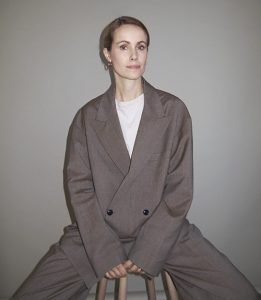Today, at a press conference just before the official opening show of Copenhagen Fashion Week, CEO Cecilie Thorsmark, unveiled the new Sustainability Action Plan 2020-2022: Reinventing Copenhagen Fashion Week – Reducing negative impacts, innovating our business model and accelerating industry change.
“All industry players – including fashion weeks – have to be accountable for their actions and be willing to change the way business is done. The timeframe for averting the devastating effects of climate change on the planet and people is less than a decade, and we’re already witnessing its catastrophic impacts today. Put simply, there can be no status quo,” urges Cecilie Thorsmark, CEO of Copenhagen Fashion Week, adding:
“Copenhagen Fashion Week is the cultural and commercial meeting place of the Scandinavian fashion industry. This gives us an enormous responsibility and the potential to create impactful change in the industry at large. By taking this direction we go from being a traditional event to being a platform for industry change.

Cecilie Thorsmark, CEO of Copenhagen Fashion Week
Sustainability Action Plan 2020-2022 presents how the event will transition to becoming more sustainable, for example by reducing its climate impact by 50% and rethinking waste systems in all aspects of event production, with zero waste as the goal by 2022. Importantly, the plan also focuses on the bigger picture by outlining how Copenhagen Fashion Week will implement sustainability requirements and set new standards for participation to push the industry toward necessary, comprehensive change.
2023 Sustainability Requirements to push the industry
From January 2023 all brands applying for a show or presentation during Copenhagen Fashion Week must meet minimum sustainability requirements to participate in the official show schedule, as presented in the action plan’s 2023 Sustainability Requirements. Participants must comply with 17 minimum standards, such as pledging not to destroy unsold clothes, using at least 50% certified, organic, upcycled or recycled textiles in all collections, using only sustainable packaging and having zero-waste set designs for their shows. When submitting an application, all brands must achieve a minimum score based on points awarded for six areas of the value chain: strategic direction, design, smart material choices, working conditions, consumer engagement and shows. A pilot test will be carried out in 2020 to collect data on the current baseline to determine the score required to participate in 2023.
“The action plan and its sustainability requirements reflect my conviction that highly ambitious goals are required to fully leverage Copenhagen Fashion Week’s influence and impact on the industry. The urgency of the situation we find ourselves in today pushes me to believe that we can no longer simply hope that progress will occur of its own accord,” explains Cecilie Thorsmark.
Contributions from industry experts
Sustainability Action Plan 2020-2022 was developed in 2019 with Copenhagen Fashion Week’s knowledge partner, In futurum, founded by Moussa Mchangama and Frederik Larsen. Copenhagen Fashion Week’s Board of Directors and Sustainability Advisory Board, comprising industry profiles such as Ganni’s founder Nicolaj Reffstrup, Global Fashion Agenda’s CEO Eva Kruse and Vogue Australia’s Sustainability Editor-at-Large Clare Press, were also actively involved in the process. The 2023 Sustainability Requirements presented in the action plan were reviewed by a panel of internationally acknowledged experts, including Orsola de Castro of Fashion Revolution, Professor Dilys Williams from the Centre for Sustainable Fashion and Professor of Biological Oceanography Katherine Richardson.





